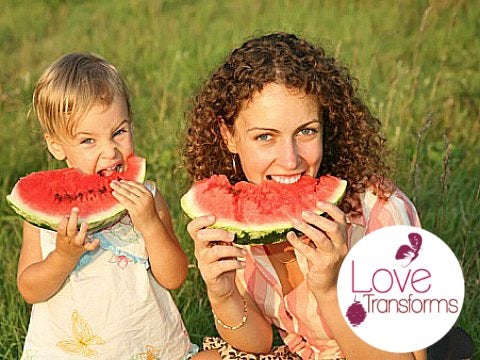
How to be good to your children? Be good to yourself!
By Sally Leboy and Meredith O'Brien Canaan — Written on Aug 01, 2013

Being a mother is a stressful, rewarding, incredible experience. Two of our experts, Sally LeBoy and Meredith O'Brien Canaan, weigh in with parenting advice that goes beyond the same old routine. In addition to loving and supporting your children, love and support yourself. After all, a strong sense of self-love helps you nurture better, healthier relationships with everyone else in your life.
From Sally LeBoy:
The concept of "Strong Mom, Strong Self," is just as important as "Strong Self, Strong Mom." Especially if, by self, we're addressing the real task of motherhood: nurturing the next generation of confident, independent and productive citizens. Our strong self is the best way to raise those future strong selves.
Becoming a mother is transforming. An entirely new dimension to our sense of self is born along with that new baby. Levels of love, commitment and sacrifice emerge greater than we ever knew were possible. We literally fall in love with that new baby; it's overwhelming. There is a strong biological imperative to form the attachments that come with motherhood. Without that deep emotional connection, we might not provide the level of care and nurturing necessary to survival of our totally helpless, dependent infants.
Babies are trying. They are completely needy: they cry, they're hungry, they poop a lot. Their only form of communication is to wail, often at really difficult times, like when you're desperate for sleep. Without a strong maternal bond, we honestly might abandon them. Our own needs and those of our partners are totally subsumed by the needs of the infant. We take care of them because we have a biological imperative to do so. The bond is intense because it has to be.
So what happens to the mom, and for that matter, the dad? For about six months, there is no mom or dad — only baby. But gradually the baby gets less dependent, and we are more free to focus on our own needs, and those of our relationship. For moms with a strong sense of self and a sound relationship, this is a welcome phase of the baby's developmental. And although it's still a very long time before they don't need us at all, it's a continuing trend towards less dependence and more autonomy. The concomitant trend is for greater opportunity for self and relationship focus and nurturance.
We could stop right here with "healthy mom, sound relationship and thriving baby." Unfortunately, this is sometimes not what happens. This happy order of events is what happens for people who have a strong sense of self and a good relationship before the baby arrives. For those who don't, the baby becomes an unhealthy focus and a distraction from what's been missing personally and relationally.
Then, the development and growing autonomy of the baby is processed as a loss, and the focus of the mom intensifies in an effort to hold on to the feelings of purpose and fulfillment that accompany motherhood. In this scenario, the investment in self and relationship seems scarier and harder than the investment in the child. A focus on self and relationship can be difficult. It can be challenging to focus inward and move toward greater self-definition. Partner relationships never offer the same degree of safety as parent-child relationships; you have to mess up pretty badly to be rejected by your child!
In my opinion, the last few generations have had an unhealthy focus on parenting. We do everything we can to prevent our kids from failing, and in so doing we deprive them of the opportunity to grow. Today's children are less independent than previous generations. They don't want to drive and they don't want to move out. I can't help but think that maybe part of the reason why is that we, the parents, don't really want them to. We want them to succeed, but we are afraid of the separation from us that is necessary to their success.
I don't pretend to understand the entire phenomenon. But I do believe it starts with an unhealthy attachment between parent and baby in infancy. By this, I don't mean not enough focus (a popular opinion), but rather, too much.
Babies should be born into families that are grown up. This means that the each parent has sufficient maturity to feel whole without the child. If there are two parents, that relationship needs to be strong enough to withstand the constant pressure that a new baby brings. These individuals will be able to let go and let their children mature into strong, independent people.
Related Stories From YourTango:
In short, never stop working on yourself and your partnership. The result will be a healthy you, a healthy relationship and a firm foundation for launching healthy children into the world. Keep reading for another story about motherhood...
More parenting advice from YourTango:
